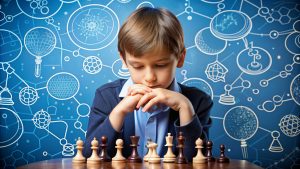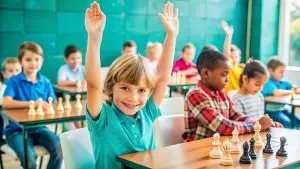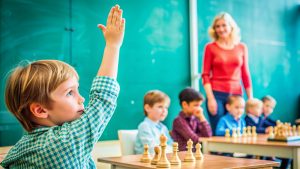How Chess Enhances Academic Performance in Students
In the competitive academic contemporary environment, seeking the most effective ways of boosting student performance becomes very important. One of those surprising yet very effective tools is chess. Whereas normally people held the view that chess is only a game or just a pastime, it holds a powerful educational resource that can be used in improving academic performance drastically. The cognitive emotional, and social benefits that are derived from it explain reasons for its inclusion in the educational curriculum. This paper will discuss the different ways in which chess helps improve academic performance among students, including information on its impact on cognitive development, problem-solving skills, concentration, discipline, and emotional resilience.
Chess is not an ordinary game of boards but a complex activity with strategy that involves very different engagement of the brain. Playing chess regularly helps students do the following: develop critical thinking skills, enhance their memory, and learn to identify patterns—all experiences that uphold academic success. In addition, students learn problem-solving skills through chess, hence helping them solve problems in a structured and orderly way. These skills are transferred into other subjects, such as mathematics and science, where analysis and strong precision prevail.
Added to this, the game of chess requires a high level of concentration and focus—attributes that go well in any academic setting. A chess-playing student learns to keep their attention focused on one thing for a long period, facilitating the ability to focus during examinations and in assignments. More importantly, chess teaches one the virtues of discipline and patience because a player has to plan out his next moves and think far ahead of several steps. Such strategic thinking helps students start to understand delayed gratification and the need for hard work if they are to be long-term academic achievers.
One more important benefit while playing chess is building emotional resilience. It teaches how to lose graciously and find a lesson in defeat as well. The same resilience will be required in their academics and for maintaining a positive attitude toward learning. Further, confidence built up through the mastering of chess will transfer into increased self-esteem and participation in class.
Integration of chess in school curricula is at the same time the most effective means of cultivating not only academically efficient but multilateral and emotionally resilient students. Analyzing a great many ways through which chess enhances academic performance, it becomes evident that this timeless game holds the key to unlocking the full potential of students. It enhances critical thinking, problem-solving, concentration, discipline, and emotional resilience among students. Thus, chess helps in preparing students to meet academic challenges and face lifelong learning.
- How does playing chess improve academic performance?Playing chess improves academic performance by developing critical cognitive skills such as problem-solving, analytical thinking, and memory. It also enhances concentration, discipline, patience, and emotional resilience, all of which contribute to better study habits and academic success.
- Can chess help with improving focus and concentration in students?Yes, chess significantly improves focus and concentration. The game requires sustained attention and careful planning, helping students develop the ability to concentrate for extended periods, which is essential for academic tasks and exams.
- What are the emotional benefits of playing chess for students?Playing chess builds emotional resilience by teaching students to handle both success and failure gracefully, manage stress, and develop patience and perseverance. These skills help students stay emotionally balanced and motivated in their academic pursuits.
- How does chess encourage discipline and patience in students?Chess fosters discipline and patience by requiring players to plan ahead, think critically, and remain focused for long periods. The game's strategic nature teaches students the value of long-term planning and delayed gratification, which are crucial for academic success.
Cognitive Development
Chess sharpens the mind, for it is a strategy-board game; hence, it may successfully play a very big role in cognitive development and never be belittled as a wonderful tool in education. Cognitive development refers to a wide range of mental processes that enable a human being to gain knowledge, think critically, and solve problems. Students particularly need strong cognitive skills to achieve their objectives in school. The significance of chess on cognitive development is presented thoroughly in the following:
-
Critical Thinking
Critical thinking is the act of looking at the facts to come up with a judgment. Chess fosters critical thinking intrinsically by its nature: it makes one consider too many probable moves and then think about the outcome. Here’s how it helps:
- Decision Making: Chess is a game of every move. So, a player has to decide on the best move by assessing the board, assessing what his or her opponent’s responses might be, and their overall strategy in doing so. In this process, players continuously develop the skill of making quick but informed decisions.
- Strategic Planning: Chess requires players to think several moves ahead. This thinking-ahead strategy can help students make strategic plans that become important in solving complex problems in mathematics and science.
- Analyzing Outcomes: Every move in chess has its consequences, and thus a player needs to analyze the possible outcomes of the moves. This assists in understanding the cause-and-effect relationship, which is at the center of critical thinking procedures.
-
Enhanced Memory
Chess is one such game that develops memory most efficiently. In this game, a player has to memorize several things to play the game well, which are as follows:
- Piece Positions: It helps a player to memorize the exact position of all pieces on the board at any moment in time. Through this, visual memory gets enhanced.
- Rules and Strategies: Remembering rules of the game and various strategies like opening moves and techniques of endgame enhance short and long-term memory.
- Opponent’s Moves: While playing, a player may remember the moves of the opponent in different instances to anticipate his strategy for the next move. This constant usage exercises their memory retention facility also.
Improved memory helps students in all their academic curricula. In subjects such as history, literature, good memory, will enable the students to remember facts and invest details. In maths and science, memory remembers formulas and concepts.
-
Pattern Recognition
Chess is a game of patterns. A player has to recognize patterns in the position of the pieces and predict his opponent’s move. So, it very easily applies to most of the scholastic disciplines, including the following:
- Mathematics: Much of mathematics deals with recognizing and creating patterns. Students who play chess gain proficiency at spotting numerical and geometrical patterns, which makes problems easy to solve.
- Such grammatical patterns and/or literary structure in a language are recognized: through reading and writing in the language arts. This, in most cases, happens because chess game players tend to develop an ‘eye’ for such patterns, helping one to grasp and analyze texts.
- Science: The central content of science involves recognizing the pattern that emerges from data. The game of chess teaches one how to look for a pattern on the board, an ability which becomes very helpful in spotting trends and patterns of experiments and observations in science.
-
Spatial Awareness
Spatial awareness simply refers to the ability to understand and appreciate space around oneself. Chess enhances spatial awareness in these ways: While moving, the player has to envision the board and predict which path each piece will travel along; this strengthens mental manipulation of objects and understanding of spatial relationships.
- Geometry of the Board: One learns the geometry of the chessboard and how all the different pieces move, which optimizes the spatial reasoning ability important in many subjects like geometry and physics.
-
Logical Thinking
Chess requires illogical reasoning to understand opponents’ tactics and find ways of evading them. This logical thinking methodology is tremendous help at school:
- Problem Solving: A good share of logical reasoning helps to break down complex problems into simple parts. Chess players develop a structured way of problem solving, very useful in mathematics, science, and engineering.
- Hypothesis Testing: In chess, players often formulate hypotheses about their opponent’s strategies and test them by making moves. This scientific approach to problem-solving gets applied directly to the experimental sciences.
-
Attention and Focus
This game offers focused concentration and energies and dedication to sustain it for a longer period. One of the key components that goes into the making of this sport is attention to detail, which translates very well into all other areas of life, especially school performance. Students who play chess concentrate their attention on any one task for a longer period of time and pay undistracted attention to lessons and examinations.
- TAttention to Detail: A chess player must be observant of everything on the board. This contributes to a trait of being meticulous over academic work, hence making less mistakes and producing quality work.

Problem-Solving Skills
Chess is reported to be very effective in developing problem-solving skills that form the core of success both in academics and life. The game itself involves a complex process of situation analysis, decision-making, and adaptation. What follows is how chess builds advanced problem-solving skills:
-
Analytical Thinking
Analytical thinking involves breaking down complex problems into smaller, more manageable parts and working through them in a systematic way. Chess cultivates this through the following aspects:
- Move Evaluation: A player needs to consider the potential outcome of each move and its effect on the game, both immediate and long-term. This process helps build the capacity for examining several factors and making an informed decision.
- Breaking down problems: In chess, this would be achieved by concentrating on pawn structure, piece activity, and control of key squares intrinsic in a complex position. This is because solving such problems will, in due course, require this very dissecting of complex situations into individual components applicable in other subjects like math and science.
- Patterns: The very ability to recognize recurring patterns in chess helps players to anticipate positions in the future and thus plan for the same. Through this skill, it enables a student to recognize patterns in data, equations and phenomena of science—these subjects being mathematics and physics.
-
Decision Making
The decision-making skills are also developed by chess. Effective problem solving requires :
- Weighing Options: Chess players weigh all the plus and minus points of each move constantly. By doing this, children learn to assess different options and estimated consequences of each choice.
- Risk Management: Chess does includes some amount of risk. But players calculate the amount of risk and reward expected out of the move. This aids players in enhancing strategic decision-making when there exists uncertainty.
- Prioritization: Decision on which piece to move or threat is to be countered first Edit involves prioritization. This is a transferable skill in academic tasks where students need to prioritize, hence, decide on which assignments to do or what to study based on urgency and importance.
-
Creative Thinking
Chess fosters thinking out of the box, requisite creativity, no doubt, by innovative problem-solving :
- Creative Solutions: There exist innumerable unique and even unexpected chess positions that require imagination to find a creative solution. Such creativity in the devised ideas aids in engineering, art, and literature.
- Beating Constraints: Chess players often find ways around such constraints to work out other avenues for a win. This helps the child in resilient creativity when faced with academic challenges in finding new and innovative solutions to complex problems.
- Strategy formulation: A player in chess makes long-term plans and modifies them as the game proceeds. This strategic vision is useful in project planning and research: knowing a priori about challenges and how one should build up to meet the challenge.
-
Logical Reasoning
Chess strengthens logical reasoning, which forms the essence of problem-solving:
- Cause and Effect: Every move in chess leads to some consequence. Players realize cause and effect relationships in chess, which is very helpful when it comes to branches like mathematics and science that deal with logical subject matter.
- Hypothesis Testing: Chess requires one to hypothesize on the moves that a player may make and test them. This is the scientific approach to getting a solution to a problem, as it suggests expectations of the outcome and then modifies strategies according to feedback received. Straightforward application includes scientific experimentation and mathematical tests.
- Deductive Reasoning: Chess requires players to deduce the right move from the given board position and the known strategies-scenarios. This type of deductive reasoning ability will help students in Mathematics or Computer Science type of subjects, where often one needs to derive the solution based on known principles.
-
Adaptability and Flexibility
Chess teaches adaptability and flexibility, crucial factors in solving dynamic problems:
- Adaptability of Strategies: Players have to adjust their strategy in view of the opponent’s moves and the ever-varied state of the board. This is vital for real-world problem-solving as conditions may change all of a sudden.
- Addressing Uncertainty: Chess concerns uncertainty, incomplete information, and, therefore how to arrive at the best possible decisions with whatever information is at hand, which greatly aids one in academic research and other real-life situations.
- Learning from Mistakes: Chess players study games to review their play and learn from the mistakes and blunders of both themself and others, which inherently creates an iterative learning process to engender a growth mindset whereby students view mistakes as opportunities for learning and growth.
-
Focusing Attention
Chess develops focus and concentration, properties in their own right needed in solving complex, thereby:
- Sustained Attention: Chess games require focused attention for extended periods of time. The sharpening of focus, part of the mind-sets, in this case, will enable the students to remain engaged with difficult academic tasks, enabling them to complete these tasks more effectively.
- Detail Orientation: The game of chess can only be won by giving due importance to minor details that often make maximum differences in the game. This skill is useful when detailed discipline, such as chemistry, comes into play. A tiny mistake can lead to massive differences.


Concentration and Attention
The focus and attention are most needed skills for excellence in studies and individual development. It is well-known in the entire world that the ability to pay concentration and attention this is highly enhanced by the game of chess because of its rigors and involving nature. Below are the major ways in which playing chess helps to boost the level of concentration and focus in students:
- Improved Academic Performance: This factor is very important because one is required to endure long hours of concentration during exams and while tackling long assignments or projects. Chess helps students get that endurance, which will pay off in better performance in academic assignments.
- Enhanced Learning: Sustained attention helps students absorb and retain information dealt with in class. This turns out to be great when students are dealing with subjects that require long durations of study, for example, history or literature.Better Study Habits: The skills learned with chess prepare a student on running purposeful study sessions with few interruptions and high productivity.
-
Sustained Attention
One very important benefit of playing chess is the development of sustained attention. Chess games can be played from a few minutes to a few hours, during which continuous focus and mental engagement is necessary. The longer period of concentration helps students in a number of ways:
-
-
Attention to Detail
Chess is a game that calls for extraordinary attention to detail. Every piece in a game of chess has to be taken into consideration, along with a full anticipation of any possible move that might come, and to notice the minutest changes in relations between pieces. It’s a skill that transfers quite broadly from that kind of task to many others:
- Precision in Work: Chess playing students learn to make their work with precision. There will be fewer errors if any in the work presented. This is important in subjects of mathematics and science as small computational errors can cause tremendous variations in results.
- Critical Analysis: Greater attention to the details in chess enhances the ability to thoroughly critically analyze texts, data, or elements of problems thoroughly for understanding and better evaluation.
Chess sharpens both the short-term and long-term memory. A chess player should remember what the opponent played, what strategies can potentially be executed, what units are placed at what location, etc. This improvement in memorization of material definitely results in increased concentration and focus:
- Retention of Information: Students with developed memory skills will retain information in a better way, leading to better recalls of exams and while undertaking academic tasks.
- Better Cognitive Function: Other than memory improvement, other overall cognitive functions, such as problem-solving and critical thinking, which are necessary for focusing on issues that require deep or long thinking, are also boosted.
-
Mental Discipline
Chess is a game that relies heavily on high mental discipline. For the players to actually play it, they have to know how to reign in their impulses, think ahead by some pieces and also keep cool. Anytime one exercises mental discipline, it has healthy implications on concentration.
- Control of Impulse: The student will resist the need to make quickly, unfocused decisions. This self-control allows them to keep their focus on target and not be distracted by frivolous issues when it comes to academic works
- Strategic thinking’: Strategic thinking and planning ability will help the students to stay focused and concerned with their assimilating goals, may it is in their study, or to personal projects undertook toward that goal
-
Managing distractions
It helps the students to manage distractions and work with an eye on their goals. While playing, there are plenty of external diversions that might make one lose, and thus they devise strategies of staying focused.
Enhanced Academic Focus: The chess-playing students can manage distractions in class and work with their eyes pinned to the work they are doing, and thus are fully absorbed in the task at hand.
These are two significant qualities that enable the person to gain academic success and mature as a person. Now, if these are quite strongly related to a game that involves great strategic planning and farsightedness, it’s got to be the game of chess. With regular practice, students learn to deal with problems systematically, keep calm under pressure, and face difficulties with time. The best depth one can find on how chess cultivates the two traits of discipline and patience in the students is as follows:
-
Strategic Planning and Foresight
Chess involves planning for several moves ahead, which contain many possible conclusions and counter schemes 〖7〗. Such a need for strategic planning is likely to cultivate self-discipline and patience.
- Goal Setting: The students must put down long term goals, which entails reaching checkmate, but also think of the short term in the process, like protecting the pieces. Such a strategy comes in handy in the academic environment as well since the student can acquire skills to set immediate and also long term academic intentions.
- Procedural Progression: Chess provides preparation for how students can chalk out their destination while staying true to the ideology of achieving anything through some small and sequential steps, which again seems reminiscent of a course that is procedural in nature, or for example, mathematics and project-based learning.
- Delayed Gratification: One is required to, many times, forego a shorter term benefit in the quest for a more substantial advantage. Realizing this helps students exercise patience and discipline in their studies. They understand that by consistently putting in the work, problems will have solutions soon enough.
-
Emotional Control and Resilience
The students are now involved in chess, a game that can, and does, place them in circumstances calling for emotional control or resilience. To meet these requirements, he/she is expected to be disciplined and patient:
- Managing Frustration: Losing pieces or facing unexpected moves could be very frustrating. Chess teaches students to withhold their emotions, keep cool, and think clearly under pressure, thus enabling them to cope better with academic stress and setbacks.
- Graceful Defeat: Learning how to lose and learn from it without feeling defeated is a very important lesson of chess. This resilience helps students look at academic challenges as opportunities for growth rather than insurmountable obstacles.
- Consistency and Persistence: Chess requires consistent practice and study to become better. This instills a disciplined attitude in the student and helps them to not easily give up and be discouraged with some tough subjects or tricky assignments.
- Careful Analysis: The students playing have to analyze the board very carefully, keeping the implications in mind of each move. For example, this detail orientation must be among their prime concerns regarding their studies since precision in many things can play a vital role—like in science experiments or mathematical proofs.
- Avoiding Impulsiveness: Rash moves can seriously handicap the game of chess for students. Students learn to avoid rashness and stop to think through decisions very thoroughly, acquiring a professional and disciplined attitude toward problem-solving.
-
Time management
Time management is one of the ingredients linked to discipline and patience. Over the chessboard, especially during timed games, students realize:
Task prioritization: The player must prioritize his or her moves and manage time; if not, they will finally run out. This is thus time management in academics—students learn how to prioritize and manage their time at work for effective study.
- Balancing Speed and Accuracy: chess players are not only better at balancing between making their decisions fast but also ensuring that, most of the time, their decisions are accurate. The students learn this and thus understand the importance of either speed or precision in their works, which is good in having efficient and effective study habits.
- Meeting Deadlines: The pressure of a ticking clock in chess is akin to the pressures faced in academic deadlines. Hanging there, performing under time fait, students develop discipline key to meeting deadlines and working through their load
-
Practice and Improvement
Chess emphasizes the value of practice and constant training; thus, the development of discipline and patience:
- Consency Practice: One gets better in chess by just practicing and learning strategies over and over again. The same reflects in his academic subjects, where through consistent study and revising, one is able to embody being taught and the guidelines provided. • Learning from Mistakes: Chess players go through a review of their games to learn about their mistakes. Reflective practice helps develop a growth mindset in students to always consider mistakes in academics as an opportunity to learn and improve.
- Incremental Progress : Progress in chess is quite slow and incremental, which will teach the students that patience pays off when it comes to achieving long-term goals. This knowledge will enable the students to keep motivated and self-disciplined when it seems to them that there is very little progress being made. 6. Problem-Solving Under Pressure
- Calm: Expert chess players are required to be composed in high pressure situations. This will help a student to face academic stress by being disciplined in taking exams or handling tight deadlines. For example, systematic approaches to problem solving—thinking ahead several steps and considering what is and what is not possible.
- Adaptation: In chess, players have to adapt to the other player’s move or the change of game scenario. This makes one patient and disciplined: students learn that sometimes they have to vary their plans and strategies due to the appearance of new information or difficulties.

Emotional Resilience
Emotional resilience is considered the ability to overcome stressful situations, to bounce back in the face of adversity. It is one of the essential skills for academic success and general wellbeing. Chess, being competitive and strategic in nature, is a very effective means to build emotional resilience in students; here is an analysis of precisely how playing chess fosters emotional resilience:
-
Handling Success and Failure
One of the deepest ways chess builds emotional resilience is through teaching players how to deal with success and failure:
- Learning through losing: Chess players will lose games, and through such losses, they learn to look back at their mistakes and use them as learning lessons. That capacity, regarding failure as a means to further learning, is critical for emotional resilience, helping students cope with academic or personal setbacks.
- Graceful Win: Success in chess, more so after winning a game that has been keenly contested, teaches students the need to be humble and graceful winners. This balanced view toward success and failure keeps the emotional balances of the child intact, irrespective of the outcome.
- Perseverance: The concept of winning and losing in cycles makes them persevere. Students learn to keep trying despite setbacks, fostering a resilient mindset that is invaluable in both academic and personal pursuits.
-
Stress Management
Chess is a highly demanding game, at times with a great deal of stress and pressure. Managing this stress builds emotional resilience. This includes being calm under pressure: Inculcating the presence of mind to remain calm and focused when required. This can be taken into other areas of a pupil’s life, where the character would be better suited to approach academic pressures—a deadline looming with exams around the turn.
- Emotional Regulation: Chess games consist of highs and lows that provide the players with an emotional balance. This emotional balance is important in maintaining resilience since the students will be poised and focused in times of challenges.
- Mindfulness and Focus: When playing chess, one enters a realm of mindfulness and focus, which can help reduce stress and channel one to emotional well-being. With this concentrated mindfulness, the students will become present and cope with anxieties in academic settings.
-
Building Confidence
Chess enables the development of a sense of accomplishment and self-efficacy, which are major constituents of emotional resilience. Mastery and achievement: With every improvement in chess skills, students experience mastery and accomplishment. This boost in confidence reflects in other areas of their life, finally helping them to deal with academic challenges with even greater self-efficacy.
- Problem-Solving Confidence: The problem-solving abilities that chess forms enhance the students’ confidence in handling complicated tasks and situations. Having such self-confidence is the key to retaining resilience in the presence of challenging problems.
- Goal Setting and Attainment: Chess includes settings and attainment of short- and long-term goals. This experience of setting and attaining goals enhances confidence by strengthening a resilient mindset.
-
Adaptability and Flexibility
Chess keeps players adjusting to situations in flux, which enhances adaptability and flexibility—ingredients of emotional resilience:
- Adapting Strategies: It is in the opponent’s moves and changes in the game that the player has to keep modifying his strategy. This flexibility will carry over into the students’ ability to adapt more readily in their academic and personal lives and better face unexpected challenges.
- Change Management: Through chess, children actually learn to keep pace with change. This is greatly supportive in building their emotional intelligence such that if change or disruption occurs in their routine, then they are composed and resourceful.
- Resourcefulness: Chess players get to operate within available resources, giving one a sense of being resourceful. This is very significant in taming difficulties or setbacks.
-
Patience and Delayed Gratification
Chess teaches patience and delayed gratification—these are important elements for emotional resilience. Much of chess success requires long-term planning, and one needs the patience to see the strategy through to the very end. This understanding of delayed gratification helps students to stay motivated and resilient even when progress is slow.
- Persistence: Through careful planning, this game of difficulty teaches one to persist and carry on in the face of challenges or setbacks. The persistence is one important factor related to emotional resilience—ability to keep working on a goal despite the presence of particular difficulties.
- Composure and Patience: No matter the age, chess will teach any player composure and patience—in tense situations. Having this sorts of calmness and patience allows the student to pass through some stressful academic situations with ease.
-
Social-Emotional Skills
Playing chess, especially as a competitive member or part of a chess club, develops the social-emotional skills that together form emotional resilience:
- Sportsmanship: Friendly competition teaches sportsmanship and respect for one another, gracious losses, and wins. Much of this comes from concrete social skills, which are the real glue that keeps people connected in close, emotionally resilient relationships.
- Empathy and Perspective-Taking: Taking into consideration an opponent’s perspective and attempting before he does creates empathy and perspective-taking. These skills develop emotional intelligence and enhance resilience by more easily navigating social interactions.
- Relating with Others: Joining chess clubs and engaging in tournaments relates students to others and creates a community responsive to their needs. These relationships provide an avenue for emotional support and increase resiliency by creating peers and mentors.
-
Reflective Thinking
Chess-Retrospection is an important element of emotional resilience. This is achieved by the following:
- Looking over games: Going through chess games helps a player to be realized his mistakes or how he won. It was noted that this practice brings self-awareness and emotional growth for students to learn from experience and thus improve.
- Self-Improvement: Through chess, the students will learn that this cyclic process of analysis and performance improvement goes on and on. Such continuous improvement and development leads to emotional resilience, where a sense of responsibility and actionability is developed in the presence of adversity.
- Mindful Reflection: Reflective thinking in chess allows for mindfulness and introspection, which helps the student grow in their understanding of the emotions and reactions they experience. This heightened ability in self-awareness stands to help in managing one’s emotions better and, through that, achieve resilience.
- What specific cognitive skills does chess develop?Chess develops cognitive skills such as strategic planning, pattern recognition, logical reasoning, and spatial awareness, which are directly applicable to academic learning and problem-solving.
- What age group benefits the most from playing chess?Chess can benefit students of all ages, but younger students, in particular, can experience significant cognitive development and academic improvement from early exposure to the game.
- Can chess help students with stress management?Yes, chess helps students manage stress by promoting emotional regulation and mindfulness. The game's competitive nature teaches students to stay calm and focused under pressure, skills that are beneficial in managing academic stress.
- How does chess teach problem-solving skills?Chess teaches problem-solving skills by requiring players to analyze complex situations, anticipate their opponent's moves, and devise effective strategies. This constant practice of critical thinking and decision-making enhances students' ability to tackle academic problems logically and creatively.
Conclusion
Chess provides a clear structure in which children can develop and enhance key skills in building emotional resilience: how to win and lose, cope with stress, build confidence, be more adaptable and flexible, patient, build further social and emotional skills, and engender reflective thinking. These are the kinds of factors that will make a difference for their academic success and personal development to help them go through adversity and rise above it. If chess is incorporated into the school curriculum, children will be better equipped with emotional resilience to face the modern world, that is slowly emerging with all its complexities and insecurities. Thus, encouraging children to play chess is investing in building up an emotionally resilient generation, confident and determined toward facing problems in life.



0 Comments